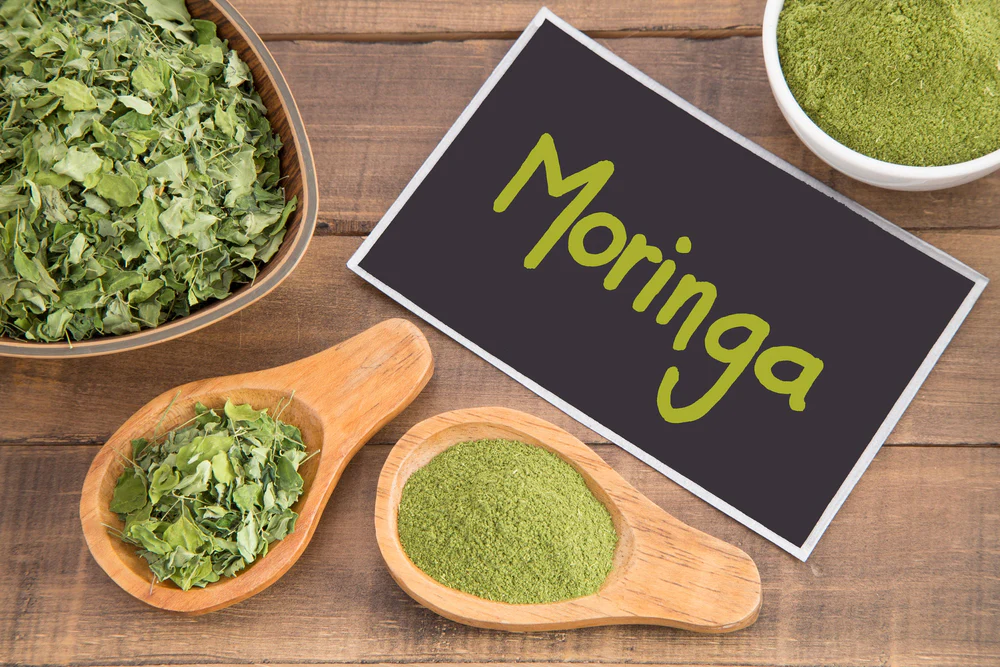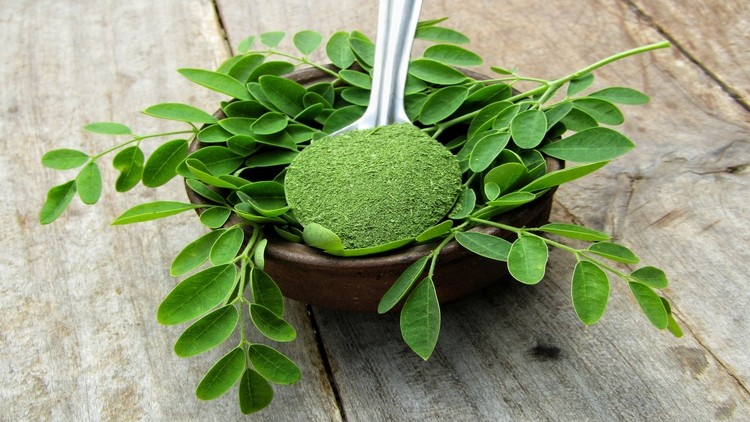Introduction to Moringa
What is Moringa?
Moringa Oleifera, commonly known as Moringa, is a small tree native to parts of India, Pakistan, Bangladesh, and Afghanistan. Often referred to as the “miracle tree” due to its rich nutritional profile and medicinal properties, Moringa has gained global recognition as a powerful superfood.
Historical Use of Moringa
The use of Moringa dates back thousands of years in ancient civilizations, where it was valued for its healing properties and used in traditional medicine. Its ability to thrive in harsh climates made it a vital resource for communities in arid regions.
Table of Contents
Nutritional Profile of Moringa
Key Nutrients in Moringa
- Vitamins: Moringa leaves are rich in vitamins A, C, and E, which are crucial for maintaining healthy vision, skin, immune system, and antioxidant properties. Vitamin A is essential for normal vision, immune function, and reproduction. Vitamin C helps in the repair of tissues and the enzymatic production of certain neurotransmitters, while Vitamin E acts as a powerful antioxidant to combat oxidative stress.
- Minerals: It is a significant source of minerals like calcium, potassium, iron, magnesium, phosphorus, and zinc. Calcium is vital for bone health, potassium helps to manage blood pressure, iron is crucial for oxygen transport in the blood, magnesium supports muscle and nerve function, phosphorus helps in the formation of bones and teeth, and zinc boosts the immune system.
- Proteins: Moringa leaves are particularly high in proteins, containing all nine essential amino acids, which is rare for a plant source. This makes Moringa an excellent protein source for vegetarians and vegans.
- Antioxidants: The leaves are loaded with antioxidants such as quercetin, which can lower blood pressure, and chlorogenic acid, which can help moderate blood sugar levels after meals. Antioxidants are vital in protecting the body’s cells from damage caused by oxidative stress.
- Fiber: Moringa is also a good fiber source, aiding digestion and contributing to a healthy digestive system.
- Omega-3 Fatty Acids: While not as well-known for its omega-3 content as some other foods, Moringa leaves do contain alpha-linolenic acid, a plant-based omega-3 fatty acid important for heart health.
Health Benefits of Moringa
Given its rich nutritional profile, Moringa offers numerous health benefits. It supports the immune system, helps in fighting off infections, and has anti-inflammatory properties. Its high antioxidant content can reduce the risk of chronic diseases such as heart disease and diabetes. The plant’s iron content is beneficial for preventing anemia, while its high calcium levels support bone health. Moreover, the presence of all essential amino acids makes it a complete protein source, which is crucial for muscle repair and growth.

Incorporating Moringa into Your Diet
Using Fresh Moringa Leaves
- Salads: Fresh Moringa leaves can be mixed into salads. Their slightly peppery taste adds a unique flavor to the greens.
- Teas: Boil fresh leaves for a few minutes to make a nutritious tea. You can add lemon, honey, or mint for flavor.
- Soups and Stews: Add chopped Moringa leaves to soups and stews, much like you would with spinach or kale. They cook quickly and offer a nutrient boost to your meals.
Using Moringa Powder
- Smoothies: Moringa powder blends well into smoothies, adding a mild, earthy flavor. Combine it with fruits like bananas, berries, and citrus fruits along with some yogurt or milk for a nutritious drink.
- Baked Goods: You can incorporate Moringa powder into bread, muffins, and pancakes. Adding a tablespoon of Moringa powder won’t significantly alter the taste but will enhance the nutritional value.
- Sauces and Dressings: Mix Moringa powder into sauces, dressings, or dips to enrich your dishes with its health benefits.
Other Forms
- Capsules: For those who prefer a quick and convenient option, Moringa capsules are available. This is an easy way to get your daily dose without altering the taste of your meals.
- Oil: Moringa seed oil, rich in antioxidants and beneficial for skin health, can be used in cooking or as a dressing for salads
Dosage and Safety
While Moringa is packed with health benefits, it’s important to consume it in moderation. The recommended daily intake of Moringa powder is about 1 to 2 teaspoons. Starting with a smaller dose allows you to monitor your body’s response.
Tips for Incorporating Moringa into Your Diet
- Start Small: If you’re new to Moringa, start with small amounts to ensure your body adapts well.
- Be Creative: Experiment with different recipes to find the most enjoyable ways to include Moringa in your diet.
- Consistency is Key: Regular consumption is crucial to reap the full health benefits, so try to incorporate it into your daily routine.
- Quality Matters: Choose high-quality, organic Moringa products to ensure you’re getting the best nutritional value.

The Environmental Impact of Moringa
Rapid Growth and Low Water Requirements
Moringa is known for its rapid growth, often maturing within just a few months of planting. This fast growth rate allows for quicker harvesting cycles, making it an efficient source of food and resources. Additionally, Moringa trees require relatively low amounts of water, making them particularly valuable in arid regions where water scarcity is a pressing issue. Their drought-resistant nature enables them to thrive in challenging climates, providing food security and nutrition in areas where other crops might fail.
Soil Improvement and Reforestation
The roots of the Moringa tree have the ability to improve soil quality. They help in preventing soil erosion and increasing soil fertility, making land more productive for other crops. This characteristic is particularly beneficial in areas suffering from soil degradation and desertification. Furthermore, Moringa trees can be used in reforestation efforts, helping to restore depleted environments and increase biodiversity. Their fast-growing nature and adaptability to poor soil conditions make them ideal for initiating ecological recovery processes.
Carbon Sequestration
Moringa trees contribute to carbon sequestration, the process of capturing and storing atmospheric carbon dioxide. They are highly effective at absorbing CO2 from the atmosphere, which helps mitigate the effects of climate change. Planting Moringa trees not only aids in reducing greenhouse gas levels but also provides communities with a sustainable source of nutrition and economic opportunities.
Sustainable Farming Practices
Incorporating Moringa into farming systems can promote sustainable agriculture practices. Moringa trees can be intercropped with other plants, enhancing biodiversity and reducing the need for chemical fertilizers and pesticides. Their leaves and pods can be used as natural fertilizers and pest repellents, further minimizing the environmental footprint of farming.
Water Purification
Moringa seeds have a unique property; they can be used to purify water. The seeds contain a protein that binds to impurities and bacteria, causing them to coagulate and settle at the bottom. This natural purification method can provide clean drinking water in regions without access to conventional water treatment facilities, reducing reliance on chemical purifiers and contributing to public health.
Moringa in Traditional Medicine and Modern Research
Traditional Uses
In traditional medicine systems such as Ayurveda, Siddha, and Unani, Moringa has been used for centuries to treat a wide range of ailments. Its leaves, bark, flowers, fruit, seeds, and root are known for their therapeutic properties and are used to create remedies for:
- Digestive disorders: Moringa has been used to treat constipation, gastritis, and ulcerative colitis. The antibiotic and antibacterial properties of Moringa help inhibit the growth of various pathogens, and its high vitamin B content helps with digestion.
- Skin conditions: Due to its antibacterial, antifungal, and antiviral properties, Moringa has been applied topically to treat infections, sores, and skin diseases.
- Diabetes management: Traditional practices have utilized Moringa to stabilize blood sugar levels, thanks to its high antioxidant content.
- Anti-inflammatory and pain relief: Moringa has been used to reduce inflammation and alleviate pain in conditions such as arthritis and rheumatism.
- Immune system support: Rich in antioxidants and nutrients, Moringa has been believed to boost the immune system and help the body ward off infections.
Modern Research
Recent scientific investigations have begun to validate many of Moringa’s traditional uses, exploring its potential in modern medicine:
- Nutritional studies: Research confirms that Moringa is rich in vitamins, minerals, and amino acids, supporting its use as a nutritional supplement to combat malnutrition.
- Antioxidant properties: Studies have identified several antioxidant compounds in Moringa, such as quercetin and chlorogenic acid, which can help prevent damage caused by free radicals.
- Anti-diabetic effects: Clinical trials have shown that Moringa leaves may help lower blood sugar levels, supporting its traditional use in diabetes management.
- Anti-inflammatory and analgesic properties: Research supports Moringa’s use in reducing inflammation and pain, with studies indicating its efficacy in conditions like arthritis.
- Cancer research: Preliminary studies suggest that certain compounds in Moringa may have anti-cancer properties, inhibiting the growth of cancer cells in vitro.
Source to Get Organic Moringa Leaf Powder Capsules
Conclusion
Moringa, with its dense nutritional profile and myriad health benefits, truly deserves its title as a green superpower. Incorporating Moringa into your daily diet could not only boost your health but also contribute to a more sustainable planet. As research continues to uncover the full potential of this miraculous tree, it’s clear that Moringa has a significant role to play in both our diets and our environment.
FAQs
- What parts of the Moringa tree can be consumed?
- How does Moringa benefit my health?
- Can I take Moringa supplements instead of the fresh leaves?
- Are there any side effects of consuming Moringa?
- How can I add Moringa to my daily diet?
